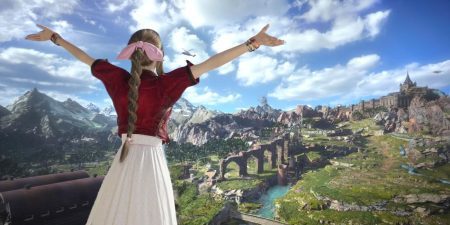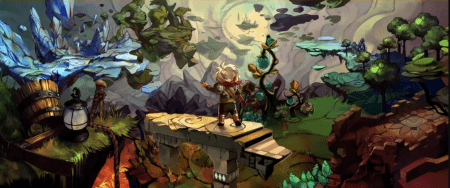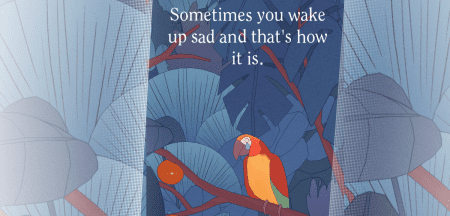Welcome back to Therapy Gaming! This month, we’re looking at Brothers: A Tale of Two Sons and its ending.
Content Warnings for: illness, death, grief
Modern narratives love a selfless hero, with a particular focus on what we can sacrifice to benefit the lives of the people around us. After all, what could be nobler than being a police officer, fire fighter, or soldier, someone willing to put their lives on the line to help people? These are our real world heroes, so it makes sense that this idea of heroism shapes our stories as well.
Spoilers for: Brothers: A Tale of Two Sons and Mass Effect 3


Mass Effect 3, divisive endings aside, has Shepard destroy themselves to save the galaxy. Most Call of Duty games end with something tragic happening to the lead, forever scarring them to protect the world. Superhero stories are the biggest offenders of this trend; one can define a Spider-Man tale by how much emotional baggage Peter Parker now has to carry for the world. We love ourselves a plot based around sacrifice. At the same time, though, we rarely ask ourselves: Is that sacrifice worth it?
The Ones We Leave Behind
At its core, Starbreeze’s 2013 opus Brothers: A Tale of Two Sons, which was recently remade by studio Avantgarden SRL, is a story about sacrifice. Set in an unnamed fantastical land, the game focuses on two brothers on a journey to find the Water of Life to save their dying father.
The title opens with the two brothers standing on a hill, looking at a headstone. Before the events of the story itself, the brothers’ mother drowned rescuing the younger from the sea. Carrying the knowledge that they cannot continue on without trying to save their remaining parent, the two travel across mountains, valleys, and battlefields in pursuit of the Water.

The older, of course, tends to shoulder more of the physical burden during the journey, going so far as carrying his scared younger sibling on his back while swimming across various bodies of water.
At a particular point in their journey, they come across a young girl being sacrificed by a tribe of warriors and rescue her. She joins the duo for a time, though she later reveals herself as a monstrous spider-creature. A chase ensues, and the brothers are forced to defeat the creature using her own limbs as weapons. Before she perishes, however, the spider-creature heavily wounds the older brother.
I later came to realize that the title affected me so deeply because I am the older brother.
Arriving at the base of the tree, the older brother encourages his younger sibling to climb and retrieve their prize. But when the younger brother returns with a flask of the Water, the older brother has passed away from his wounds.
The younger brother tries to revive his brother with magical substance, but to no avail. He buries the older under stones and journeys home on a griffin the two saved earlier. Using the spiritual guidance of his mother and brother, the younger is able to conquer his fear of swimming and return back to the village by himself in time to save his father. Happy ending!
Except instead of ending there, the camera returns to the hill it opened on at the beginning of the game. Now stands the younger brother and the father, healed and healthy, before two gravestones. Overcome with grief, the father collapses into tears, forcing the player to ask themselves if any of this was worth it.

What We Do For Love
At the time of Brothers’ release, I was writing for and hosting a podcast called the Bonus Pretzel Podcast. I remember starting an episode an hour or so after finishing my time with the game, and my co-host asking me for my thoughts. I choked up and froze. All I could get out was that it was special, and that I couldn’t say anything more. Now, I’m not at a loss for words easily, as you could probably tell by my verbose writing style. But at the time, I had nothing for Brothers. I couldn’t even say whether it was a good or bad experience, just that it was different.
I later came to realize that the title affected me so deeply because I am the older brother. When I was 15 years old, in the span of a single year, my father was diagnosed with aggressive cancer and my mother passed suddenly from an underlying condition. In the blink of an eye, my life flipped completely. Gone were the sunshine days, replaced with needing to be a stabilizing force for my brother, five years younger.
I couldn’t show fear or sadness; I needed to be an anchor for the people in my life. My father needed my support as he slowly faded, and my brother needed a person to make sense of the world around him, so I sacrificed everything I could. I stopped dreaming of traveling or performing and instead focused on making money and providing stability. I spent night after night helping my father from bed to bathroom to vomit after treatment, got my brother out the door for school, all while also needing to keep my own life afloat so no one got worried. I burned down my world around me to make sure everything else was fine.
The older brother did what was right. Right?
It didn’t help. My father still passed from his cancer battle, though he fought tooth and nail for years. My brother still spiraled, and our relationship has fractured over the years. I was left alone, picking up the pieces of a life I gave everything to support. But even through all that, I was certain that I would still make those same choices. Because that’s what we do, right? Don’t we sacrifice for those we love, to bring them joy and peace?

Was It Worth It?
Years later, I experienced Brothers and the way it framed my life perfectly, in particular the tale of the stout and strong older brother, willing to do anything to keep one parent for his younger sibling, even willing to die, all to make sure that sibling didn’t end up as alone as he felt.
But the game itself doesn’t say that is the right choice to make. Instead of validating that sacrifice, that heroic need to throw oneself off the cliff, the game chooses to end with the father, crumbled to his knees, weeping at what he’s lost. The implicit message I took was always the same: he never asked for this. The sacrifice for his life was too great and that he, the father, would never have chosen this for his sons.
Is that sacrifice worth it?
That’s not typically the kind of story we’re told. We are told that life will always go on, and that its always better for someone else to be standing than ourselves. But what if it isn’t? I couldn’t wrap my head around this idea. I did what was right, I was certain. The older brother did what was right. Right?
Ending The Cycle
It took years for me to realize how poisoned I was by my need to self-sacrifice. Years of unpacking my own self-worth, years of finding passions again, and years of therapy. I am proud to be able to say that I’m…not completely done yet. After all, we are constantly improving and finding new threads to pull.

Ultimately, Brothers helped me realize that, deep down, the older brother was terrified. He was scared of the grief he had already experienced, and broken by losing his mother so dramatically with nothing he could do about it. So to hide that, he became, in his mind, “strong.” He strove to sacrifice to make sure no one would feel that pain again, sure, but also to make sure HE would never have to feel that pain again. Instead of grieving with his brother and providing guidance and comfort, he fought tooth and nail against fate.
I fought to never admit I was scared of losing anyone again. In the end, what I sacrificed didn’t stop the illness that took my father. And while I would have done anything to bring him back and sacrificed even more to keep him comfortable, I know exactly what he would say to me: that my happiness, and my life, were more important to him than any extra day I could give him.
We live our lives for the people we love, but they live their lives for us too. We are just as important to them as they are to us. So, honor them a little, and let them sacrifice for you too.
Gary is a jack-of-all-trades video game enthusiast based in Boston, MA. A semi-professional fighting game player, even less professional Apex Legends player, and even less professional adult, he spends most of his time poking at strange indie gems and reading about the need for more diverse voices in gaming criticism. He invites anyone to recommend anything he's missed in the gaming world via Twitter or BlueSky, where he can found under the username @grtnpwrfl. When he isn't spending his time playing games, Gary is an avid New England Patriots fan and frequent hiker.










